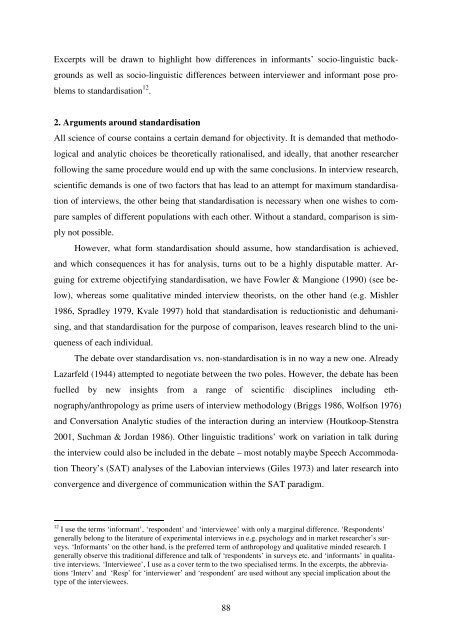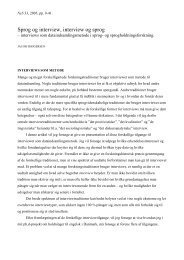Hør dog hvad de siger - Note-to-Self: Trials & Errors
Hør dog hvad de siger - Note-to-Self: Trials & Errors
Hør dog hvad de siger - Note-to-Self: Trials & Errors
Create successful ePaper yourself
Turn your PDF publications into a flip-book with our unique Google optimized e-Paper software.
Excerpts will be drawn <strong>to</strong> highlight how differences in informants’ socio-linguistic back-<br />
grounds as well as socio-linguistic differences between interviewer and informant pose pro-<br />
blems <strong>to</strong> standardisation 12 .<br />
2. Arguments around standardisation<br />
All science of course contains a certain <strong>de</strong>mand for objectivity. It is <strong>de</strong>man<strong>de</strong>d that methodo-<br />
logical and analytic choices be theoretically rationalised, and i<strong>de</strong>ally, that another researcher<br />
following the same procedure would end up with the same conclusions. In interview research,<br />
scientific <strong>de</strong>mands is one of two fac<strong>to</strong>rs that has lead <strong>to</strong> an attempt for maximum standardisa-<br />
tion of interviews, the other being that standardisation is necessary when one wishes <strong>to</strong> com-<br />
pare samples of different populations with each other. Without a standard, comparison is sim-<br />
ply not possible.<br />
However, what form standardisation should assume, how standardisation is achieved,<br />
and which consequences it has for analysis, turns out <strong>to</strong> be a highly disputable matter. Ar-<br />
guing for extreme objectifying standardisation, we have Fowler & Mangione (1990) (see be-<br />
low), whereas some qualitative min<strong>de</strong>d interview theorists, on the other hand (e.g. Mishler<br />
1986, Spradley 1979, Kvale 1997) hold that standardisation is reductionistic and <strong>de</strong>humani-<br />
sing, and that standardisation for the purpose of comparison, leaves research blind <strong>to</strong> the uni-<br />
queness of each individual.<br />
The <strong>de</strong>bate over standardisation vs. non-standardisation is in no way a new one. Already<br />
Lazarfeld (1944) attempted <strong>to</strong> negotiate between the two poles. However, the <strong>de</strong>bate has been<br />
fuelled by new insights from a range of scientific disciplines including eth-<br />
nography/anthropology as prime users of interview methodology (Briggs 1986, Wolfson 1976)<br />
and Conversation Analytic studies of the interaction during an interview (Houtkoop-Stenstra<br />
2001, Suchman & Jordan 1986). Other linguistic traditions’ work on variation in talk during<br />
the interview could also be inclu<strong>de</strong>d in the <strong>de</strong>bate – most notably maybe Speech Accommoda-<br />
tion Theory’s (SAT) analyses of the Labovian interviews (Giles 1973) and later research in<strong>to</strong><br />
convergence and divergence of communication within the SAT paradigm.<br />
12 I use the terms ‘informant’, ‘respon<strong>de</strong>nt’ and ‘interviewee’ with only a marginal difference. ‘Respon<strong>de</strong>nts’<br />
generally belong <strong>to</strong> the literature of experimental interviews in e.g. psychology and in market researcher’s surveys.<br />
‘Informants’ on the other hand, is the preferred term of anthropology and qualitative min<strong>de</strong>d research. I<br />
generally observe this traditional difference and talk of ‘respon<strong>de</strong>nts’ in surveys etc. and ‘informants’ in qualitative<br />
interviews. ‘Interviewee’, I use as a cover term <strong>to</strong> the two specialised terms. In the excerpts, the abbreviations<br />
‘Interv’ and ‘Resp’ for ‘interviewer’ and ‘respon<strong>de</strong>nt’ are used without any special implication about the<br />
type of the interviewees.<br />
88



